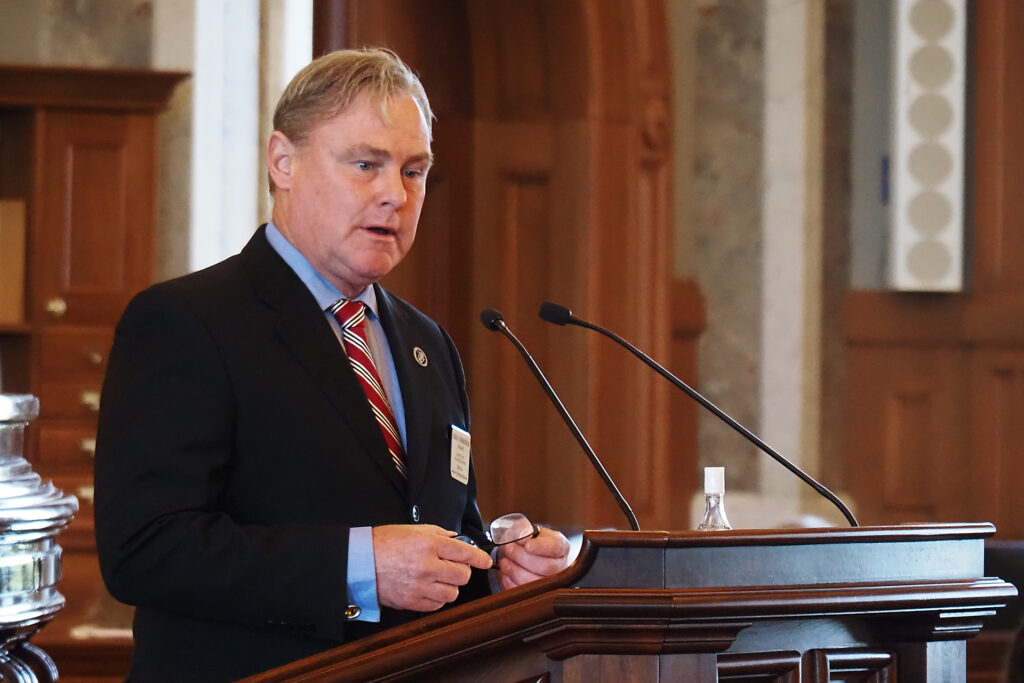Rep. Sean Tarwater, R-Stilwell, helped persuade the Kansas Legislature to pass a state sales tax incentive for developers of Kansas data centers valued at more than $250 million. On Wednesday, the planning commission of the Unified Government of Wyandotte County and Kansas City, Kansas, voted to endorse plans for a $12.6 billion data storage facility west of the Kansas Speedway. (Sherman Smith/Kansas Reflector)
TOPEKA — The planning commission of the Unified Government of Wyandotte County and Kansas City, Kansas, endorsed a proposal to establish a 550-acre business park for construction of a $12.6 billion data center that would become part of the internet’s backbone.
The planning commission voted 4-2 to recommend Wednesday the Unified Government Board of Commissioners adopt a package of rezoning, preliminary platting and master plan amendments to accommodate six huge buildings with a total of 1.8 million square feet. The “hyperscale” facility bisected by Parallel Parkway would be on property currently zoned for residential or agriculture use.
“We think it’s responsible development that’s going to bring the absolute best bang for the buck to the county,” said Corb Maxwell, an attorney representing developer Red Wolf DCD Properties.
No corporate occupant has been publicly disclosed for the site several miles west of the Kansas Speedway, but it would likely be one of big-tech companies Apple, Meta, Microsoft, Amazon or Alphabet.
Maxwell said the business park designation would lead to a development that looked more like office buildings than an industrial complex. The property would be ringed with eight-foot earth berms, 3,000 trees and other landscaping to obstruct the view of people living nearby.
Homes on the perimeter of the property would be 500 feet to 1,400 feet from the nearest data center building, he said.
“It’s very much about … how do we give all of the neighbors the maximum buffer we can,” Maxwell said. “You’re trying to deliver a high quality development with attractive buildings. You’re trying to have performance standards that say all operations shall be conducted within a fully enclosed building. You’re saying no noise, odors, vibrations or other impacts shall be discernable off the premises.”
The energy-devouring data center buildings would be packed with computer servers supporting the digital economy. Developers pledged to pay the cost of utility upgrades necessary to extend electricity service to the data center, a commitment that included paying the UG Board of Public Utilities to build two substations.
The substations would be called on to handle 600 megawatts of power. That would be an amount greater than BPU’s current 500 megawatt capability, meaning the project would need to drawn from the Southwest Power Pool.
“We believe it is growing power resiliency as well as growing revenues for the BPU and is a real reason for pushing this forward,” Maxwell said.
‘Against it. Period.’
Planning commissioner Aaron Ward, who voted against the project, said anyone driving around the proposed site would quickly understand it was an agriculture region dotted with fields, pastures and livestock. The idea of dropping a business park into a mix of farmsteads and residential neighborhoods didn’t make sense, he said.
“In no way, shape or form is this industrial,” Ward said. “I just don’t see how it fits in with the community that we have there, because it really doesn’t.”
James Sheets, who owns property in the development zone, was among folks who attended the planning commission meeting to register opposition.
“I’m against it. Period,” he said. “This project has got me totally surrounded. I guess because I never returned calls about selling.”
The UG should include in the development blueprint a requirement the data center run on solar or wind power, said Ty Gorman, who works with the Sierra Club. Albert McComas, who lives near the site, said the UG should establish a fund to compensate residents if their water wells became contaminated due to heavy construction.
Neal Palmer, another critic of the project, proposed a 30-day delay in the planning commission’s vote to determine whether developers ignored a handful of procedural requirements.
Liberty Church representative Rich Lavin said the data center could be a deterrent to people who might otherwise attend the Parallel Parkway church in the future.
“There is simply too many unanswered questions concerning these data centers,” Lavin said. “Let your conscience be your guide.”
Tax advantages
Advocates touted economic development potential of the project, and the fact it could become the county’s largest source of property tax revenue at an estimated $12.9 million annually. The land on the site currently generated about $43,000 annually in property tax revenue for the city, county, state, schools, colleges and library.
“We believe these rezoning projects for the data centers is a strategic and forward-thinking decision,” said Greg Kindle, president of the Wyandotte Economic Development Council. “Development will occur in this area. We believe a business park would be preferable to alternatives that we’ve been looking at, including apartment complexes.”
During the final day of the 2025 session of the Kansas Legislature, a 20-year state sales tax exemption was approved for construction of Kansas data centers costing a minimum of $250 million.
The sales tax break covered purchases for development, acquisition and operation of a data center, including land and site improvements as well as buildings and equipment; labor services to install and maintain data center equipment; purchases by a contractor to build or modify a data center; as well as acquisition of backup generators.
A data center accepting the state sales tax break couldn’t take advantage of a law lowering utility rates for large economic development projects by 20% to 40% over 10 years. The bill required developers to buy electricity for 10 years from the public utility providing the area’s retail service.
Read the full article here


